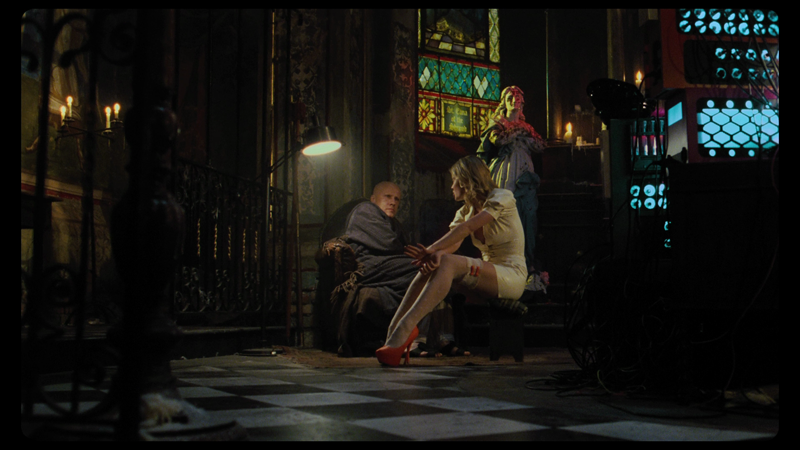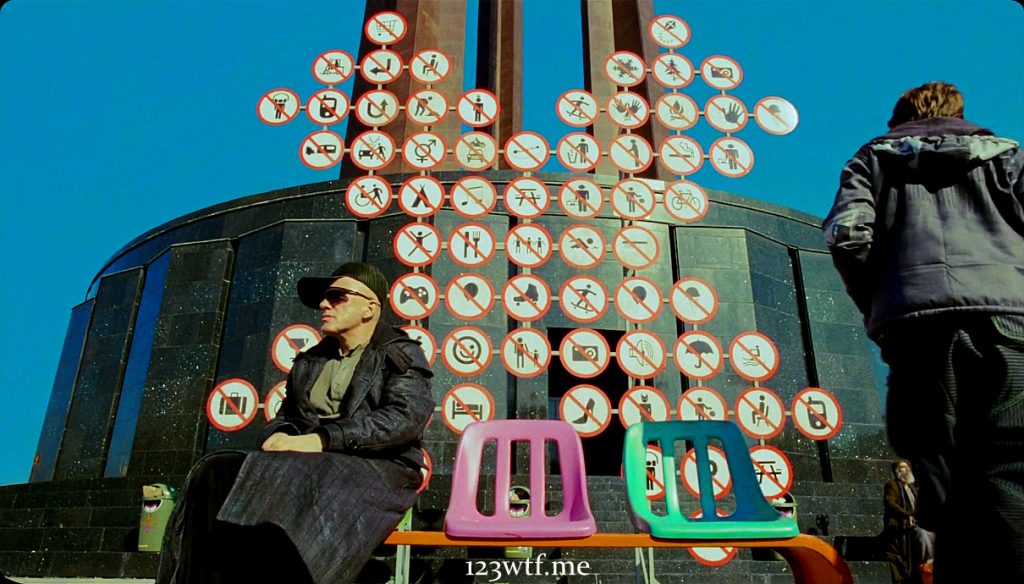I have always been a fan of Terry Gilliam, his animations with Monty Python, his totally unique sense of humor, his crazy movies. But I have to admit, his movies are not for everyone. And if you are one of those individuals that they are not for…I’m sorry but, you have to go now. Shoo. Go on. Because, seriously? What is wrong with you? The man is an auteur, and a genius! Seriously though, I get it that Gilliam is not for everyone. He’s convoluted, and eccentric. At the best of times, he’s opaque. At the worst of times he may just be completely deranged. But Zero Theorem was brought up on THiNC.’s movie recommendation page (That red tab below? Yeah, that.) by ARM, and after a pile of you approved the movie I figured, heck, why not, let’s talk about it.
For those of you unfamiliar with Gilliam, he was the animation inclined member of the British comedy troupe Monty Python. He also brought us, Brazil, 12 Monkeys, and The Fisher King (among many other films). His post Python films are rife with confusing movies that require meticulous care to extract meaning or understanding from his films. But they generally deal with the inevitability of fate, and the meaninglessness of life. Which, brings us to Zero Theorem.
Zero Theorem, not too unlike Pi, is a complicated mind job of a movie that tells the story of a mathematician searching for the meaning of life. The movie is filled with futuristic bombasticism (not too far off from mysticism?), and corporations working their employees on nonsensical, soul crushing, mind numbingness. And we follow, Qohen Leth (played by Christoph Waltz) as he desperately searches for his own particular raison d’etre amidst the chaos and insanity that is this life.
So, that is our own personal huckleberry today – our Mount Everest of a discussion topic. If you haven’t seen it yet, do yourself a favor – do it. Regardless of whether I was able to convince you to watch it or not, don’t keep reading if you haven’t. I’ve even planted mean booby traps below that will drop you into an Indiana Jones pit, and spear you in the face if you do. Or something.
Zero Theorem Quick Walkthrough
Qohen Leth is a little crazy. Qohen refers to himself in the plural. (You would think that the only thing better would have been if he had used the second person, wouldn’t you?) Qohen basically does very very complicated math, which he does because he is suffering. What kind of suffering is our dear protagonist doing? I’m glad you asked, he is suffering from an enormous dollop of existential malaise. So Qohen waits, and waits, and waits, for a phone call that he just knows that will bring him the meaning of life. (Note to the reader, this eternal waiting for this phone call is a metaphor. A search for the meaning of life, purpose, and reason for why we are all here. And trust me, we’ll get back to this metaphor, seeing as though this is really the only thing that matters in this entire movie. (Not that it’s insignificant at all…))

Well, Qohen, in an attempt to stay at home, so that he can stay closer to his phone…(you recall, the whole meaning of life thing) he attempts to get himself classified as disabled. (Which includes evaluation after evaluation from a Dr Shrink-ROM, which is an AI assistant, created to give mental evaluations.) He ultimately goes to a party at his manager’s request, wherein he meets Management (played by Matt Damon). But is labeled insane by him. Eventually he is given his opportunity to work from home, and begins hanging out with Bainsley (played by Mélanie Thierry).
Qohen begins his new home assignment by gathering all the other data that all the other workers at the company had crunched. His new goal is to solve the Zero Theorem. Which, as far as I can tell, is a fictional mathematical formula that proves that nothing is everything, or the converse. I can’t remember. Zero equals 100%. Mancon is hellbent on figuring out this equation which will then help them figure out how best to sell to its customers. But Qohen doesn’t know this, he only knows that by figuring this out he may be one step closer to the meaning of life, the universe, and everything. But ultimately, Qohen becomes totally frustrated and destroys his computer. Bainsley shows up soon after, and that is when we learn that Qohen is certain that he hung up on the meaning of life.

The Meaning of Life and Zero Theorem
Now, there’s a number of twists and turns here, but Qohen begins talking in depth with Bainsley (some inside VR experiences, others in real life). Qohen even goes so far as to suggest ditching Management, and eloping together, An idea which Bainsley forcefully rejects. Soon after, we learn that Bainsley is apparently a spy for management. Not only that, but when not with Qohen, Bainsley is a webcam stripper.
In the middle of this real life relationship drama, Bob (played by Lucas Hedges – who has since shot to super stardom in films like Manchester by the Sea, et al.) comes and tells Qohen that the phone call is a myth. It doesn’t exist. Then, cut to, Bainsley coming back to Qohen and apologizing for the chaos, for lying, for deceiving him…and that actually, she fell in love with him. And she offers to elope with Qohen, but Qohen turns her down. (To be honest, the rest of the movie is icing, the entirety of the meaning of the movie was right here.)
After rejecting Bainsley, Qohen learns that his home is filled with surveillance cameras, which he destroys. And soon after, Qohen puts on his repaired VR suit and is almost electrocuted as a result. And as the movie begins winding down, Qohen meets with a hologram of Management that lets him know that there is no meaning of life, and that God didn’t exist to grant him his phone call. Qohen was chosen to work the Zero Theorem solely because he had faith in finding meaning out of nothing. And it was this equation that Mancon was intent on profiting from. After which, he lets him know that Qohen isn’t needed anymore, and then Management disappears. Qohen flips out, destroys the Neural Net, and finds a black hole inside. Jumping in, he arrives back at the Virtual Reality beach that he and Bainsley shared their first kiss. And as the credits roll, we can hear Bainsley calling out to Qohen, as if we hadn’t caught the point of the movie earlier on.

Yes, But What Does It All Mean?
First, think about your own life. If it’s anything like mine it’s filled with cubicles, filing cabinets, managers, paperwork, and administrivia. In short, it’s a lot like Qohen’s. It’s a repetitive rinse and repeat that is constantly forcing you to wonder if this is really worth it. Think about it, you literally only get one go at this life. And you spent 2 hours watching this film, then spent another 30 minutes perusing the web trying to figure out what the heck it means. And you know what, just like that, you burned .0005% of your entire life. Poof. Gone. So a large swath of the beginning of the movie is about what it is that we are choosing to spend our lives on. The daily grind is a tree shredder that will devour your life if you aren’t careful. Sure, work that cubical job, but love it. It isn’t worth it otherwise. So that’s the first thing we are talking about here.
Likewise, you need to do your own searching for the meaning of life. What is Life with a capital L for you? I personally believe that there is one big meaning of Life for everyone – but that’s just me. The bigger question is, are you even searching for meaning? Have you given up your soul to the monotony of the routine, of the monotony of the hamster wheel? If so, we’d both be better off jumping into the Grand Canyon together. Seriously. Might as well go out with a massive pyrotechnic bang. And that is one thing that Qohen is doing here that we should all admire – not ridicule him as insane. Hear this, Qohen is the only sane person in this movie. Why? Because he is critically evaluating his life. He is investigating the insanity that modern living is doing to the people living in this culture and world.
But what about the meaning of life bit? Well, Qohen very clearly had a shot at the meaning of life, at least, the meaning of life that Gilliam would have us believe to be is real. And that was when Bainsley came back. She apologized for selling him out. She realized that she was in love with Qohen and his insane proclivities. And she asked him to elope with her. THIS! This was Qohen’s phone call. BUT HE DIDN’T PICK IT UP.
What phone calls are you missing out on because you are too hell-bent on that massive Minecraft macramé project in your garage. (I am one to talk…I just embarked on coding a recreation of the Atari 2600 game Adventure (in my copious spare time, hahaha!) just for giggles.) Or you are too focused on good things, like the gym. Or reading. All good things. But are the precluding you from the meaning of life? Someone in my life decided to share with me about a family member who had been diving deep into post modernist philosophy (from the sound of it, a lot of Heidegger, Nietzsche, and Hobbes most probably) and was bottoming out in a depressive state. Which, personally happened to me in college too. That conversation, which was honest, and heartrending, was my meaning of Life. Nothing else mattered more than hearing about how hard this guy was having it, watching their family member struggle at the hands of these complex and mind-gripping philosophers. Honest, true dialogue, and love. Deep and undying.
And here is this opportunity, standing right in front of Qohen, of deep, and undying love…a chance at the meaning of the universe (or a thin slice of it anyway), and what does he do with it? He walks away from it. And we see this absence, dreadfully accentuated, when, Qohen lands back on the beach where he was first there with Bainsley. I personally like to think that the digital Qohen heard the voice of Bainsley, calling from further up on the beach, and he runs to her and is reunited with that one relationship in his life that was capable of real meaning. But who knows. Terry Gilliam isn’t one for happy endings, so I’m doubting that that is what that meant. But who knows.
Here’s what Gilliam had to say in an interview he did a few years back about the seminal moment in the movie that really mattered the most:
“The most important decision to me, and the most dooming thing, is when Bainsley says “Come away with me,” and he can’t do it! And yet, even after that, the boy brings some paternal instinct out. He cares about him. And even that’s taken away. Impotence is the heart of it.
Those of us who pay attention to the world [we live in], who read the news, feel we can do something about it. Then you realize how impotent you are to change things. And that’s the sad thing. I talk about all these other things, but that’s the heart of [the movie]. I created the world around him, but that’s not really the movie, that’s the stuff around it.
Some people get it immediately: some people identify or feel something for Qohen, understand where he is. Other people are just confused by it. [When looking at ratings for the film], fives are great and zeros are great, the middle is very vague and I like that because I know [they’re] experiencing something. That’s all I’ve tried to do — leave bits of shrapnel in them like I’ve had bits of shrapnel left in me from other films. We entertain as best we can, but we also try to reach people.
I don’t know – what was your takeaway at the heart of Zero Theorem. Is it impotence? Is it meaning? Is it a chiding to not give up? Is it a hopelessness? What do you think Zero Theorem is telling us about this life we live – what is it teaching to us about how to live each day of our lives?
Edited by, CY

